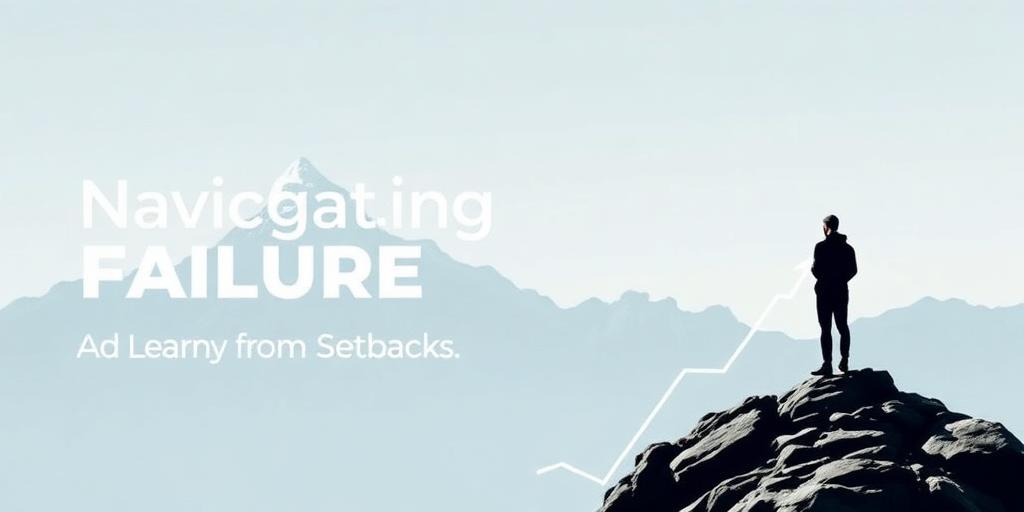Navigating Failure: Learning and Growing from Setbacks
Failure is an inevitable part of life. Whether it's a missed deadline, a failed project, or a personal disappointment, setbacks are bound to happen. However, it's not the failure itself that defines us, but how we respond to it. This article explores strategies for navigating failure, transforming setbacks into learning opportunities, and fostering personal growth.
Understanding Failure
Failure is often viewed negatively, but it's essential to recognize that it's a natural part of the learning process. Understanding the nature of failure can help us approach it with a more constructive mindset.
- Failure as Feedback: Instead of seeing failure as a dead end, view it as valuable feedback. It provides insights into what didn't work, why it didn't work, and what can be improved.
- Distinguishing Types of Failure: Not all failures are the same. Some are due to lack of effort or preparation, while others are the result of external factors beyond our control. Identifying the type of failure can help us tailor our response.
- The Importance of Perspective: Our perception of failure significantly impacts our ability to learn from it. Avoid catastrophizing or dwelling on negative emotions. Instead, try to maintain a balanced perspective.
Strategies for Navigating Failure
Navigating failure effectively requires a proactive and intentional approach. Here are some strategies to help you turn setbacks into opportunities for growth:
- Acknowledge and Accept: The first step is to acknowledge the failure and allow yourself to feel the emotions associated with it. Suppressing or denying these emotions can hinder the healing process.
- Analyze the Situation: Once you've acknowledged the failure, take a step back and analyze the situation objectively. Identify the factors that contributed to the setback and determine what could have been done differently.
- Learn from Your Mistakes: Use the insights gained from your analysis to identify specific lessons learned. What will you do differently next time? What skills or knowledge do you need to develop?
- Reframe Your Mindset: Challenge negative thoughts and beliefs about failure. Replace them with more positive and empowering ones. For example, instead of thinking "I'm a failure," try thinking "I'm learning and growing."
- Set New Goals: After learning from your mistakes, set new goals that are aligned with your values and aspirations. Having a clear sense of direction can help you stay motivated and focused.
- Seek Support: Don't be afraid to ask for help from friends, family, mentors, or colleagues. Talking about your experiences can provide emotional support and valuable insights.
- Practice Self-Compassion: Be kind and compassionate to yourself during times of failure. Remember that everyone makes mistakes, and it's important to treat yourself with the same level of understanding and empathy that you would offer to a friend.
Transforming Setbacks into Growth
By embracing failure as a learning opportunity, we can transform setbacks into catalysts for personal growth. Here are some ways to cultivate a growth mindset:
- Embrace Challenges: Seek out opportunities to stretch your abilities and step outside of your comfort zone. Challenges provide valuable learning experiences and help us develop resilience.
- Cultivate Curiosity: Approach new situations with a sense of curiosity and a willingness to learn. Ask questions, explore different perspectives, and stay open to new ideas.
- Focus on Effort and Progress: Instead of fixating on outcomes, focus on the effort you put in and the progress you make. Celebrate small victories and acknowledge your accomplishments along the way.
- Develop Resilience: Resilience is the ability to bounce back from adversity. Cultivate resilience by developing coping mechanisms, building strong relationships, and maintaining a positive outlook.
Conclusion
Failure is an inevitable part of life, but it doesn't have to define us. By understanding the nature of failure, implementing effective navigation strategies, and cultivating a growth mindset, we can transform setbacks into opportunities for learning and growth. Embrace failure as a valuable teacher, and you'll be well on your way to achieving your goals and living a more fulfilling life.









